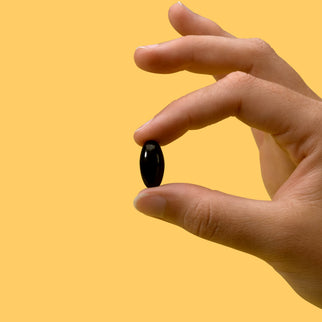Nootropics are a category of substances that can potentially support our cognitive abilities and brain function. Nootropics are lauded for their potential to support various cognitive functions and overall cognitive performance.
Join us as we dive deeper into nootropics to explore their history, how they affect us, a few common examples, and the potential benefits.
What Are Nootropics?
Nootropics, often dubbed as "cognitive enhancers" hold promise for our cognitive abilities. When we say cognitive abilities, we're referring to a broad spectrum of mental capabilities. This includes memory, both in terms of recall and retention, creativity, critical thinking, and even motivation. The idea of supporting these abilities is appealing to many otherwise healthy adults, especially in today's fast-paced world where mental agility can be a valuable asset.
For instance, a student might use nootropic supplements to support their focus during exam season, or an entrepreneur might use them to fuel their creativity when brainstorming a new business idea. Even those in their later years might turn to nootropic supplements to help maintain their cognitive health and keep their memory sharp.
The History of Nootropics
The story of nootropics began in the 1970s when the term was first coined by a Romanian psychologist and chemist, Cornelius E. Giurgea. The term nootropics comes from the Greek words "nous," meaning mind, and "trepein," meaning to bend or turn. Giurgea believed that nootropics should enhance learning and memory, protect the brain, support the efficacy of brain-related control mechanisms, lack a strong sedative or stimulatory effect, and be devoid of side effects with extremely low toxicity.
Since Giurgea's time, the interest in and study of these cognitive enhancers have grown exponentially. Neuroscience has embraced the study of nootropics, attracted by their potential beneficial effects on cognitive abilities and executive functions.
Over time, nootropics have found their way into various areas of medicine, being studied for their effects on certain conditions.
While nootropics are not a cure, they do represent a compelling frontier in our ongoing quest to understand, preserve, and enhance cognitive function throughout our lives. As our understanding of the brain continues to grow, so too does the potential for nootropics and their role in cognitive health.
What Are the Different Types of Nootropics?
The world of nootropics is broad and diverse, with a range of substances that can influence our nervous systems and mental performance in various ways. To make sense of this vast landscape, it's helpful to categorize nootropics into two primary types: natural and synthetic.
Natural
Natural nootropics are substances found in nature that have been identified to have cognitive-supporting properties. They are often derived from plants and herbs, and are generally considered to be gentler and safer than their synthetic counterparts.
Here are some common examples of ingredients that are thought to have the ability to support cognition:
- Caffeine: This stimulant, found in coffee and tea, is perhaps the most widely consumed nootropic. It works by blocking adenosine receptors in the brain, reducing fatigue, improving concentration, and lowering reaction time.
- Ginkgo Biloba: An extract from the leaves of the Ginkgo tree, this nootropic is believed to support memory and mental processing by maintaining blood flow to the brain.
- L-Theanine: Found in green tea, L-Theanine supports relaxation without drowsiness, leading to support for attention and focus.
- Ashwagandha: This Ayurvedic herb is known for its tension-soothing properties, potentially supporting focus and easing mental fatigue.
- Bacopa Monnieri: Another Ayurvedic herb, Bacopa Monnieri is believed to support short-term memory and cognitive function.
- Rhodiola Rosea: This adaptogenic herb helps the body properly adapt to stress, potentially supporting mood, energy, and cognitive function.
- Panax Ginseng: Often used in traditional Chinese medicine, Panax Ginseng may support overall mental function and the proper ability to withstand stress.
- Creatine: This amino acid can help with energy metabolism in the brain, potentially supporting cognitive function.
- Omega-3 Fatty Acids: Essential for brain health, omega-3 fatty acids, particularly DHA and EPA, are crucial for supporting neuronal function and structure.
Synthetic
Synthetic nootropics are man-made substances that often require a prescription. They are typically used to treat specific conditions, but some healthy individuals use them off-label to enhance cognitive function.
Here are some common synthetic nootropics:
- Adderall & Ritalin: These stimulants are commonly prescribed for ADHD. They can increase alertness and attention. The key difference between the two is that Adderall is considered an amphetamine, while Ritalin is not.
- Modafinil: Originally developed to treat narcolepsy, Modafinil (Provigil) can decrease fatigue and increase alertness.
- Racetams: This family of synthetic nootropics, including Piracetam, is known to enhance memory and cognition.
- Methylphenidate: Another medication used to treat ADHD, it can improve working memory and cognitive function.
- Memantine: Used to treat symptoms of Alzheimer's disease, it can stabilize cognitive function in those with cognitive impairment.
Do Cognitive Supplements Really Provide Benefits?
As the interest in cognitive enhancement continues to grow, you might be wondering what benefits nootropics could potentially offer. While individual experiences can vary, research suggests that the right supplements may provide a range of cognitive and wellness benefits.
Let's delve into some of these potential benefits:
Memory Support
One of the most sought-after benefits of cognitive supplements is their potential to maintain a healthy memory. This can range from support for recall – that is, the ability to retrieve information you've learned in the past – to support for memory consolidation, which is the process of forming new memories.
Focus Support
In today's world of constant distractions, maintaining focus can be a challenge. Certain supplements are known for their potential to enhance concentration and attention, helping you stay on task whether you're studying for an exam or working on a project.
Overall Cognitive Function
Beyond memory and focus, nootropics and supplements may also support broader cognitive function. This can include aspects like decision-making, problem-solving, and information processing, all of which are crucial for day-to-day life.
Mood Support
Some supplements can support proper levels of neurotransmitters related to mood, potentially providing a lift in spirits or helping to reduce feelings of tension. This support can contribute to an overall sense of well-being.
Energy Support
Feeling perpetually tired can significantly impact your quality of life. Certain supplements, including some types of B vitamins and amino acids, can help support your energy levels, reducing feelings of fatigue.
Support for Sleep Quality
Good sleep is the foundation of good health, and some nootropics can help improve your sleep quality. For instance, supplements like melatonin can help support your sleep-wake cycle, making it easier to fall asleep and wake up refreshed.
Support for Creativity
Creativity isn't just for artists – it's a valuable skill in many areas of life. Certain nootropics can boost divergent thinking, helping you think more creatively and come up with innovative solutions.
Do Nootropics Have Any Side Effects?
Like any substance that affects your body, nootropics and other supplements can have side effects. These can vary widely depending on the specific nootropic and the individual taking it.
Common side effects can include headaches, digestive issues, and insomnia, particularly if taken late in the day. Some nootropics, especially stimulatory ones, might also lead to increased heart rate or high blood pressure in some individuals.
It's also worth noting that some nootropics can interact with medications or other supplements, so it's crucial to consult with a healthcare professional before starting any new nootropic regimen.
It's essential to follow the recommended dosage for any nootropic. More is not always better, and taking too much of a nootropic can increase the likelihood of side effects. As with any supplement, safety should always be your top priority.
The Takeaway
While individual experiences with nootropics can vary, research suggests that they may provide a range of cognitive and wellness benefits.
However, like any supplement, nootropics should be used responsibly, with consideration for potential side effects. Always consult with a healthcare professional before starting any new supplement regimen.
Here at iwi life, we're passionate about supporting your health journey with our range of sustainably sourced, plant-based omega-3 supplements. Explore our line of products today and discover how you can support your brain health using natural supplements with iwi life.
Sources:
Nootropics as Cognitive Enhancers: Types, Dosage and Side Effects of Smart Drugs | PMC
The Mind Bending Quest for Cognitive Enhancers | PMC
Establishing Natural Nootropics: Recent Molecular Enhancement Influenced by Natural Nootropic | PMC
A Guide To The Best Nootropics, Recommended By Experts | Forbes Health
The Safety and Efficacy of Botanicals with Nootropic Effects | PMC


















